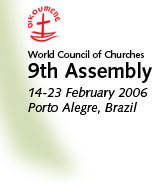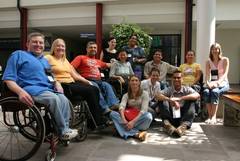 |
WCC > Home > News & media > News | ||||
| About the assembly | Programme | Theme & issues | News & media | |||||
 |
|
||||
|
13.02.06
Disabled people challenge WCC inclusivity
More articles and free photos at
Disabled people will try to affirm the church as an inclusive community, but the struggle for recognition at the decision-making levels of the World Council of Churches will be a long and difficult struggle since it was only at the 1998 Harare Assembly that the Ecumenical Disability Advocates Network was established as a full programme of the WCC.
General secretary Samuel Kobia met with the disabled participants during pre-Assembly meetings and committed himself and the Geneva headquarters to full inclusion in all programmes.
In a classroom packed with people living with a wide vareity of disabilities from almost all regions of the church, Kobia presented his vision of inclusion and challenged the EDAN leadership to make their impact heard and felt in Porto Alegre "because it has been a major ommission at previous assemblies".
Kobia engaged in a lively discussion with more than 100 EDAN representatives, especially around their small representation among the 691 delegates. Of that number, Kobia noted, only one percent were from EDAN. Men represent 67 percent, women 37 percent, but only three delegates are disabled, along with five advisors.
"You will have to be a very visible presence. You have performed exceptionally well since Harare and are already a world-wide network that has been faithful to the vision of an inclusive ecumenical movement.''
EDAN has its headquarters in Nairobi under the full-time co-ordination of Samuel Kabue, a blind Kenyan, who stressed, however, that EDAN is not an African programme but a full part of the WCC although based outside Geneva. It has a well-deserved reputation for action and efficiency in its short WCC life, Kobia said, noting that" in a world that is not enabling to disabled people, EDAN presents a different attitude to the 9th Assembly and you must come up with a strong statement of what transformation means - that perspective brings a critical view of transforming the world."
The pre-Assembly group tackled the general secretary about their lack of official representation. "Who in these abled, male-dominated churches are going to give up one of their precious delegates to the disabled? How do we get on programme and policy reference committees let alone the central and executive committees so that our concerns are taken seriously and your vaunted inclusion becomes a reality?"
Another contradiction that EDAN participants noted was the use of "we-they" language in WCC material, indicating that disabled people were outside the overall ecumenical movement because of their situation. Kobia was pushed to educate staff and other members of the ecumenical movement to practise inclusion as well talking about it." Another participant complained that the blind cannot read WCC material.
"You have to learn to internalize our needs. We were often told not to talk. Now we will talk, and we also talk about our poor disabled - those who are hidden, those who have the least of short resources like water and housing and food. We are frustrated at this marginalization seven years after Harare," a participant from Asia said.
Kobia acknowledged their frustration, but urged them to work with him to overcome the processes and get things done politically and consciously. "There is no doubt the institutional culture of the WCC must be changed," he said. He was especially critical of the attitude of many African churches towards the ministry to disabled people.
As Kobia left, he was gently reminded by Kabue that "We will be watching you carefully".
Assembly website: www.wcc-assembly.info
|
|||
|
|
|


